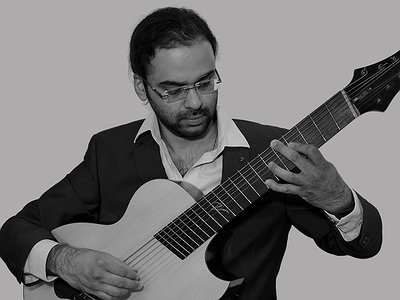Part 2
Can you talk about a breakthrough work, event or performance in your career? Why does it feel special to you? When, why and how did you start working on it, what were some of the motivations and ideas behind it?
I guess it would have to be my 1st String Quartet, ‘A Prayer for Mother Nature’. I wrote the piece in 2019, and it was supposed to be recorded in 2020 but this has still not happened because of the pandemic. The piece exists only on sheet at the moment, but that will change in the near future.
This piece was special for two reasons. Firstly, I dedicated it to ‘mother nature and the victims of global warming’ and it is probably the only piece of mine to date, that is conceptually and narratively based around a social cause. I was really stirred by the mistreatment that we as a people have doled out to our environment; I was determined to make an impact with the music, and I believe I could manage to do that.
Secondly, I believe I set a personal bar for myself with this piece, in terms of the objective musicality of it : it is probably the deepest and greatest music that I have ever written, in my own opinion.
There are many descriptions of the ideal state of mind for being creative. What is it like for you? What supports this ideal state of mind and what are distractions? Are there strategies to enter into this state more easily?
Contrary to a lot of pop-philosophy and the generalized societal understanding, creativity is a habit. I don’t ‘get lucky’ when I make something. I am consistently creative because I have done everything that I could possibly think of, to enable myself to be in that state. In my own experience, I believe that time, space, health, process and concentration are all essential to creativity. By ‘time’ I mean a fixed schedule - I am expected to be creative during these hours, and I can’t run away from it, no matter what. Even if I’m not feeling inspired, there are things that I can do, workflows I can follow, that can still lead to something creative. By ‘space’, I mean the workspace - one must be comfortable, at peace and without a care in the world at their workspace.
Then there comes the matter of health. If one isn’t healthy, physically and mentally, and the body and soul are not available in their fullest possible capacity, then one cannot realize their fullest potential. Meditation and physical fitness, through daily yoga, is essential to my process and it tremendously aids in improving concentration, and most importantly, it helps me to get in the right state of mind for creativity.
I also have an infallible, shatterproof workflow : a process that will never let me down, because it has come from years of experience. However, no matter how disciplined one is, distractions are quite impossible to get rid of. Anything that isn’t music is a distraction when I’m working. These may range from rather mundane things like answering the door or the phone to life itself expecting you to leave work and sort things out. One must be able to compartmentalize work and everything else. I certainly try to set out some time for all the distractions that I can account for.
Music and sounds can heal, but they can also hurt. Do you personally have experiences with either or both of these? Where do you personally see the biggest need and potential for music as a tool for healing?
I make sense of my world through music. It is the most potent elixir of healing for me. I face the joys, sorrows, anger, pain, confusion, frustration, peace, optimism, hope and pessimism of life, per se, but I truly understand these emotions through music. On different occasions, my music has moved me to utter bliss, dreamy and lucid contemplation, spiritual upliftment, dissonant rage, romantic ecstasy, rock bottom lows, and tears.
The healing power of music has been thoroughly documented in entire professional disciplines such as music therapy, and everyone feels this power to varying degrees, but I really did sense, early on, that I had a deeper connection to music than most others. In this world of increasing detachment, crass commercialization, hypocrisy, apathy, insta-culture, meaninglessness and diminishing attention spans, we are losing our way, and music, in its truest sense, can play a role in our journey back to ourselves, if we bother to set forth on that journey.
There is a fine line between cultural exchange and appropriation. What are your thoughts on the limits of copying, using cultural signs and symbols and the cultural/social/gender specificity of art?
Art, in my opinion, is borderless and androgynous. While this is great to state in principle, there is indeed a lot of art and music that is insolently passed on as a ‘fusion’ of genres and as a distasteful appropriation of established cultural symbols. Having been personally influenced by several ethnic traditions of music from across the world, I believe that one must tread with caution when incorporating an established art form in their own practice. I feel that it is best to only be ‘inspired’ by certain forms and then take them wherever one pleases, as opposed to recreating them in an effort to satisfy the pallbearers of the tradition or its faithful audience. However, it is indeed not an easy task to achieve the right balance.
This magical and rather elusive balance can of course only be done in the right spirit by someone who has spent time and effort in studying the form. One should respect the foundations of the tradition, while not being derivative, and then create new art that is far beyond the confines of the source.
Our sense of hearing shares intriguing connections to other senses. From your experience, what are some of the most inspiring overlaps between different senses - and what do they tell us about the way our senses work?
For me, visual stimulus, especially painting, is inspirational. After achieving a certain familiarity with one’s art form, one is in a better position to appreciate and learn from more fundamental building blocks of art and creativity, and it is then that I could seek great pleasure in the paintings of Van Gogh, Monet, Modigliani, Picasso, Kandinsky (Wassily) and the likes.
For instance, I can ‘see’ rhythm at work, in Kandinsky’s works. When I see him playing with geometry and perspective, I can see that I try to do the same within the confines of rhythm. The human skin, tactile and ever so omnipresent in our experience of our everyday lives, can teach us about dynamics. An olfactory impulse can teleport us into a certain time, space and mood. The senses perceive what the mind has been trained (or untrained) to perceive.
Art can be a purpose in its own right, but it can also directly feed back into everyday life, take on a social and political role and lead to more engagement. Can you describe your approach to art and being an artist?
My art is largely an exercise in spiritual and affective abstraction. It is very rare that I’d take up a social or political cause, but of course, that has its space and I occasionally find myself delving into these aspects, like I did with my 1st String Quartet.
I like to think of my music as a sonic autobiography or auditory memoir of sorts: a congregation of what I have felt, thought and perceived over a lifetime. I let life, people, events and circumstances influence my soul, and this stimulus is then expressed in the form of music, with a narrative that could range from a mood or emotion, to a thought or idea or to a painting or a poem or even a different performance art such as theater or dance. My music is an attempt at giving my life meaning, and finding answers to all the bigger questions that I have, with regards to life and 'how it all works'. I do believe that within all these notes, rhythms and textures, I found myself, and I continue to do so.
What can music express about life and death which words alone may not?
Music at its greatest, becomes a living entity. A piece must breathe; it must change, emote; have clarity, meaning; it must go somewhere and it must be born and it must die. It can teach us about what it means to be human, and we can find ourselves in it. It can give us purpose. It lives on after we die, and I guess in some way, we are all just trying to tell future generations, and even the people around us, that we were here or we are here, at this moment in time. It points to the eternal soul, and life itself.






